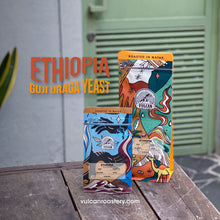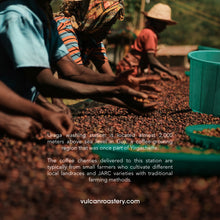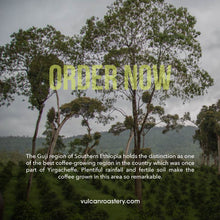إثيوبيا - جوجي أوراجا
الخميرة الملقحة الجافة الطبيعية

المزرعة: محطة غسيل أوراجا
الصنف: أصناف JARC، سلالات محلية
المعالجة: خميرة ملقحة طبيعية جافة
الارتفاع: 1,945 فوق مستوى سطح البحر
منتج: مزارعين مختلفين
المنطقة: غوجي
ملاحظات التذوق: التوت الأزرق، المانغستين، الجاك فروت

حول هذه القهوة
تستقبل محطة غسيل أوراجا الكرز من المزارعين في المنطقة المحيطة. تقع المحطة في غوجي، وهي منطقة زراعة البن التي كانت ذات يوم جزءًا من ييرجاتشيفي ولكن مناخها المحلي ينتج قهوة فريدة من نوعها، لدرجة أنه تم تخصيصها كمنطقة خاصة لزراعة البن.
زراعة
تظل أساليب الزراعة في المنطقة تقليدية إلى حد كبير. وعادة ما يزرع مزارعو ييرجاشيفي أشجار البن مع محاصيل غذائية أخرى. وهذه الطريقة شائعة بين صغار المزارعين لأنها تعظم استخدام الأراضي وتوفر الغذاء لأسرهم.
بالإضافة إلى استمرار الزراعة التقليدية، فإن معظم المزارع تعتمد أيضًا على الزراعة العضوية. وعادة ما يستخدم المزارعون في ييرجاتشيفي القليل جدًا من الأسمدة أو المبيدات الحشرية ــ إن وجدوا على الإطلاق. ويتم تنفيذ معظم أعمال المزرعة يدويًا من قبل أفراد الأسرة المباشرين.
للاستفادة من المناخ الرائع، تقدم محطة غسيل أوراجا التدريب لمساعدة المزارعين على إنتاج كرز بجودة أفضل. يركز التدريب على إجراءات حصاد ونقل الكرز.

الحصاد وما بعد الحصاد
يقوم المزارعون باختيار الكرز الناضج بعناية وتسليمه إلى المحطة. يتم تخمير الكرز بالكامل باستخدام خميرة أورو من Lalcafe.
تم تطوير خميرة LALCAFÉ ORO™ (Saccharomyces cerevisiae) خصيصًا لإنتاج القهوة على مدار أربع سنوات من الأبحاث والتجارب. أظهرت التجارب في مناطق وبيئات مختلفة أن الخميرة Oro مناسبة تمامًا للتحكم بشكل أفضل في كفاءة العملية الرطبة وتحسين جودة الكوب. إن قدرة الخميرة Oro على الازدهار حتى في درجات الحرارة المنخفضة تعني أنها مناسبة بنفس القدر للاستخدام في معظم الارتفاعات. تتمكن الخميرة من التحكم في عملية التخمير ضد خطر الكائنات الحية الدقيقة المسببة للتلف والتي يمكن أن تولد عيوبًا غير مرغوب فيها. علاوة على ذلك، فإن عملية التمثيل الغذائي الخاصة بها وسعتها العالية حتى في درجات الحرارة الباردة (15 درجة مئوية على الأقل داخل خزان القهوة) تسمح بالتعبير عن الخصائص الطازجة والفواكهية لحبوب القهوة مع احترام نكهات كل قهوة فريدة من نوعها.
كما أن وقت التخمير الأطول للقهوة المعالجة بالخميرة (عادة ما تستغرق عملية التخمير المغسولة حوالي 12 ساعة) يسمح أيضًا بتطور النكهات. يتيح الوقت الإضافي للحبوب امتصاص المستقلبات، مما قد يعزز النكهات. يتم تعزيز التعقيد والحموضة والسطوع والنوتات الزهرية والمزيد من خلال وقت التخمير المطول.
بعد التخمير، يتم وضع الكرز ليجف في ضوء الشمس المباشر على أحواض مرتفعة. ويقوم العمال بتقليب الكرز بشكل متكرر لضمان التجفيف المتساوي. يستغرق تجفيف الكرز ما يقرب من أسبوعين إلى ثلاثة أسابيع.
القهوة في اثيوبيا
في حين تشتهر إثيوبيا بأنها موطن القهوة، إلا أنها تظل اليوم من أكثر مناطق صناعة القهوة المتخصصة شهرة بفضل تنوعها المذهل في النكهات. وفي حين كان التتبع الكامل للقهوة أمرًا صعبًا في التاريخ الحديث، فقد جعلت اللوائح الجديدة الشراء المباشر ممكنًا.
الشراكة المباشرة مع المزارعين لمساعدتهم على إنتاج دفعات متخصصة عالية الجودة والتي يمكن تتبعها الآن بشكل كامل، مما يضيف قيمة للمزارعين ومحمصي القهوة على حد سواء.
إن الجودة الاستثنائية للقهوة الإثيوبية ترجع إلى مجموعة من العوامل. فالتنوع الجيني لأصناف القهوة يعني أننا نجد تنوعًا في النكهة، حتى بين (أو داخل) المزارع ذات ظروف الزراعة والمعالجة المتشابهة. وبالإضافة إلى الأصناف، تساهم طرق المعالجة أيضًا في الجودة النهائية. والمكونات الرئيسية النهائية للقهوة الممتازة في إثيوبيا هي تقاليد الإنتاج التي خلقت التنوع الجيني والبنية الأساسية للمعالجة والقهوة الرائعة التي نتمتع بها اليوم.
إن أغلب المنتجين في إثيوبيا هم من صغار المزارعين، ويستمر أغلبهم في زراعة البن باستخدام الطرق التقليدية. ونتيجة لهذا، فإن أغلب أنواع البن تُزرع دون استخدام الأسمدة الكيماوية أو المبيدات الحشرية. وتتم زراعة البن وحصاده وتجفيفه بالكامل تقريبًا باستخدام أنظمة يدوية.









